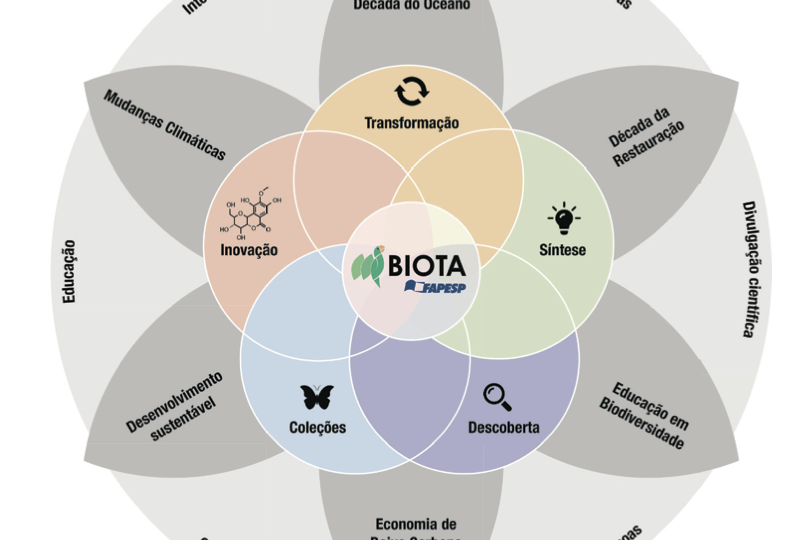
Synthesis science can be understood as a new form of scientific production that seeks to explore the boundaries of scientific disciplines to generate new ideas, models, paradigms, and theories based on the organization, re-analysis, re-interpretation, or re-contextualization of previously collected data.
Scientific syntheses make it possible to deal more effectively with complex problems that require the integration of knowledge or approaches from different disciplines. It is thus a participatory, collaborative and transdisciplinary approach that encourages associative and creative thinking between fields of knowledge, also known as lateral thinking. This approach requires the explicit participation of heterogeneous groups of researchers (e.g., knowledge domains, seniority, and expertise in data analysis tools) throughout the knowledge generation process to enhance the identification and exploration of new ideas. For syntheses focused on current environmental issues or problems, the participation of other social actors (e.g. environmental managers, decision-makers, resource users, and traditional populations) in the co-creation of knowledge and solutions is crucial. The knowledge generated in this way has a greater potential to lead to socially relevant products, especially those that support decision-making and the formulation of public policies.
Synthetic science complements and adds value to other scientific approaches to understanding biodiversity, as it uses and re-signifies data obtained from field research or laboratory experiments. In particular, it is hoped that data generated by other Biota 2030 initiatives, such as Biota Discovery and Biota Transformation, will be integrated and re-contextualized here to advance scientific knowledge.
It is important to note that the State of São Paulo has favorable conditions for the development of biodiversity data analysis and synthesis initiatives since it has: (i) a mature, productive scientific community trained in data analysis and modeling, with experience in collaborative networking; (ii) a broad and spatially organized set of biological data (e.g., species occurrence records) and environmental data (e.g., climate, relief, use and cover); and (iii) a rich biodiversity with abundant potential for providing ecosystem services that can enhance agricultural production and mitigate climate change. g, species occurrence records) and environmental data (e.g., climate, relief, land use and land cover); and (iii) a rich biodiversity with great potential for providing ecosystem services that can enhance agricultural production and contribute to climate change mitigation and adaptation, as well as to the transition to more resilient and healthier landscapes for its people (see Biota Transformation). Synthesis initiatives can be an effective way to bring research closer to environmental decision-makers in support of public policy.
This promotion of “synthesis science” in the State of São Paulo should be done in close collaboration with other similar initiatives in Brazil, such as the Synthesis Center for Biodiversity and Ecosystem Services (SinBiose), led by CNPq. The articulation between these initiatives will make it possible to cover a greater diversity of socio-environmental systems throughout the national territory, as well as to address issues of broader national or international interest, welcoming contributions from researchers, managers and decision-makers from all over Brazil.
MAIN GOAL
To promote collaborative synthesis science to integrate knowledge and stimulate new ideas, approaches and solutions related to the understanding, conservation or use of biodiversity.
CHALLENGES TO BE ADDRESSED
- Formation of national and international synthesis research networks;
- Training a new generation of researchers capable of working collaboratively in research networks;
- Produce integrated and inter/transdisciplinary knowledge;
- Developing strategies to solve complex problems;
- Evaluate and promote the organization and public sharing of biodiversity databases;
- Facilitate the interaction of researchers with different societal actors in the search for solutions to socio-environmental problems and towards sustainable transitions (similar and complementary to Biota Transformation).
ACTIONS
- Collaborate with other Synthesis Centers, planning and launching calls together with the SinBiose-CNPq program and other well-established Synthesis Centers, especially those in Germany, France, Canada and the United States;
- Establish a new research grant option (a “Synthesis Grant”) that integrates support for the organization of events with funding for postdoctoral fellows;
- Encourage projects funded through Biota Program solicitations to have public data repositories or to publish data papers;
- Encourage the involvement of social actors (e.g. governmental, non-governmental, local or traditional populations) to collaborate in applied synthesis research, especially those aimed at finding solutions to today’s most pressing socio-environmental problems (see also Biota Transformation);
- Promote integration and synthesis events between projects supported by the Biota Program on topics of interest to society or with clear implications for public policy, fostering interaction between projects supported by the Biota Program.
GOALS
- Launch at least one synthesis call every two or three years.
- Support at least five projects in the new funding modality (“Synthesis Grant”) every two or three years;
- Support at least two young researchers per call for synthesis activities in biodiversity science;
- For each funded project, make the new data generated publicly available through at least one new dataset or publication of a data paper per project;
- Support at least one event (e.g., webinar, workshop) every two years to stimulate or present transdisciplinary synthesis results (with governmental or non-governmental partners).
